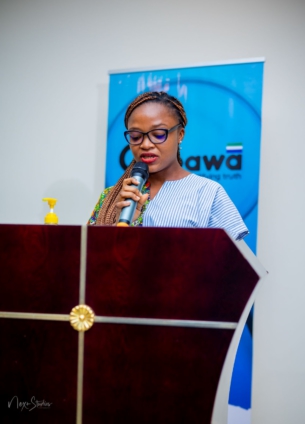Media and research professional Caroline Anipah, has contributed to the critical discourse on the growing issues of misinformation and disinformation, offering valuable insights and strategies to combat these challenges.
Drawing from her extensive experience in research and media, Mrs. Anipah joined Joy News’ AM Show via Zoom to shed light on the complex dynamics of false information. She carefully distinguished between misinformation and disinformation, underlining their unique characteristics and implications.
According to Mrs. Anipah, “Misinformation refers to information that is false but shared without the intention to cause harm.” In contrast, she defined disinformation as “false information deliberately created with the intention to cause harm, shape public opinion, and influence people’s behaviours.”
Highlighting the deliberate nature of disinformation, she remarked, “A lot of emphasis is put into creating disinformation, so it’s not always a mistake by someone. Across the world, disinformation tends to influence behaviours and impacts people’s democracy.”
Mrs. Anipah urged Ghanaians to be vigilant about emerging trends, particularly during sensitive periods such as elections. She noted that the proliferation of disinformation often leaves people unsure of how to interpret or handle the vast amount of information they encounter.
“We’ve noticed that people are increasingly uncertain about how to consume information because they believe there is disinformation everywhere. As a result, they stop tracking the sources of what they read. For instance, as we approach an election, people are confused about what they are hearing,” she said, referencing a recent case involving Wontumi FM to illustrate her point.
Mrs. Anipah emphasised that disinformation is a significant issue in Ghana that requires urgent attention. “I am glad that we are beginning to focus on this, and it’s encouraging to see a collective effort to address the problem,” she stated.
According to UNESCO’s LASP survey, 87% of respondents in a global survey expressed concerns that disinformation could influence elections in their countries with 47% being "very concerned."
Latest Stories
-
My sister inspired me to start a fashion business – Diana Hamilton
5 minutes -
SIC Insurance PLC donates 50 laptops to KNUST
10 minutes -
I turned down specific brands because of my faith – Diana Hamilton
14 minutes -
‘Those who validate ghosts will pay’ – Finance Minister declares war on public sector payroll fraud
20 minutes -
GN Bank Chicago declared safe and sound by U.S. regulator
28 minutes -
Dando Manufacturing wins top honours for excellence in specialised drilling equipment and engineering solutions
39 minutes -
Private citizen donates patrol vehicle to Nkawie Police to boost crime prevention
48 minutes -
Gov’t has worked hard to stabilise exchange rate, it’s time to lower prices – Finance Minister tells businesses
51 minutes -
GJA orders re-run of Ashanti Regional Chairperson elections
56 minutes -
Gov’t to deploy AI at ports to curb revenue leakages – Finance Minister
58 minutes -
NPA scandal: Two more co-accused granted bail after meeting requirements
1 hour -
Gov’t launches forensic audit of stalled projects following loan discrepancies – Finance Minister
1 hour -
Minority Caucus demands repeal of L.I. 2462 as galamsey threat deepens
1 hour -
Full text: 2025 Mid-Year Budget Review presented by Finance Minister
1 hour -
State actors shielding galamsey networks – Minority Caucus alleges
1 hour

